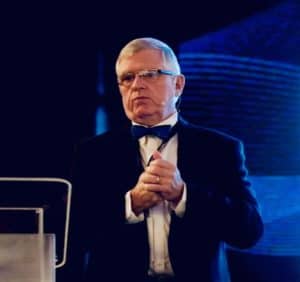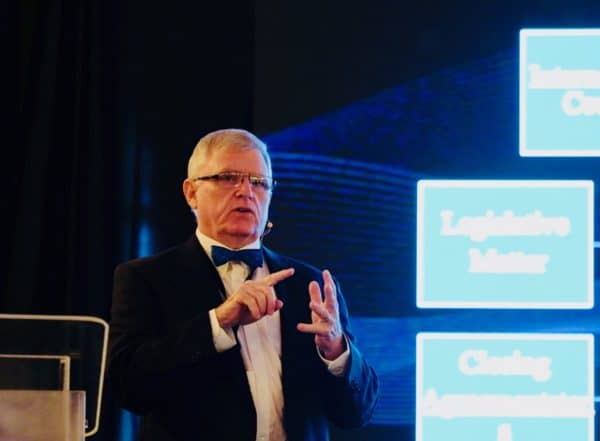George Joyner has Puerto Rico in his blood. The Commissioner of the Office of Financial Institutions is a veteran player who has spent his whole career in the fast-growing banking and, latterly, FinTech industry in the US territory of Puerto Rico, with the exception of two years in Florida. Born on the mainland, he was brought to San Juan as a six-month-old baby. Bilingual in Spanish and English, Joyner is an American and a passionate Puerto Rican.
Puerto Rico’s tax-favored status has proved attractive to both mainstream finance and players from cryptoland. Joyner understands and shares the local passion for growth, but as the gatekeeper of Puerto Rican standards, he will only allow growth to occur in the fashion he considers prudent.
Crowdfund Insider caught up with him at the recent financial summit organised by one of Puerto Rico’s newest financial institutions, Kinetic International.
Crowdfund Insider: The tax-privileged status of Puerto Rico is attracting a lot if interest from financial institutions. But will PR be able to hang on to this status?
George Joyner: The tax relationship between PR and the US is stable. PR has a good history of competence in financial services, and there’s a good depth of talent of people in the sector. The biggest challenge PR faces is in compliance, but it is a challenge that is being met.
CF: How would you characterise the mix of players in Puerto Rico’s financial sector?
George Joyner: There’s a lot of private banking, which reflects a wealth of expertise. PR is sufficiently well connected to the financial services mainstream to offer a first point of contact with the US financial system for those who’ve not dealt with it before.
There are a lot of transaction-oriented companies in PR. There’s been substantial growth in payment companies, and middle- and back-office divisions of corporations whose sales forces are elsewhere.
CF: So Puerto Rico will keep its tax advantages?
George Joyner: The IRS is present in PR. Companies have to comply with Federal Advisory Committee Act code. Enforcement procedures are necessarily selective: If transactions throw up discrepancies or look suspicious, the commission will act in association with the Financial Crimes Enforcement Network, the Federal Reserve, and the FBI.
 In a recent case a company failed to report what was suspicious activity. He Commission went in and required review some 32,00 transactions, and compelled the company to go back and review all transactions for two years previously.
In a recent case a company failed to report what was suspicious activity. He Commission went in and required review some 32,00 transactions, and compelled the company to go back and review all transactions for two years previously.
The Holy Grail for many companies is to get unfettered access to the US payment system. With this comes oversight of reporting by the Fed. The Federal Reserve is naturally selective in its scrutiny, and looks at correspondent banking relationships, track record, that the parties are well established and respectable – all those things. PR offers a good way of getting access to the system.
The scrutiny process is rigorous – but that’s good. Our asking tough questions is not your problem. Companies need us to do that to access the US system.
CF: PR has a reputation as being a cryptocurrency-friendly territory. Are you concerned by the sharp downturn in the markets in major cryptocurrencies over the past year and a bit?
George Joyner: The good news is that the industry is developing a taxonomy. ICOs are very clearly securities and are treated as such under Regulation D of the Federal Securities Exchange Act.
Some other types of cryptos may be fundamentally a replacement for fiat currencies. Bitcoin and Ripple are among the cryptos that fall into this category. Others are consumables – a way of consuming a service.
All three are regulated under different frameworks.
Some other jurisdictions, notably Wyoming and New Jersey, are putting regulatory laws on their books that seem to demonstrate a very adventurous appetite for risk. We look at the legislation on blockchain being passed by these States and this is not an appetite for risk that we share.
CF: Despite the downturn, do you see cryptocurrencies and blockchain-related technology as a growth area for PR?
George Joyner: Yes. Differentiating virtual assets from blockchain technology is very important. There’s a space for virtual assets that won’t go away. The CFTC has come up with a definition of ‘actual delivery’ that allows the exchange of these assets to be traded and regulated, along with the creation of a mercantile exchange in this area.”
I’m happy to see a definition of cryptos emerging which is a unit of value, with a space to contract, and also a unit of measure – that is, it’s something that’s able to be audited.
CF: So the crypto bear market’s a good thing?
George Joyner: I’m very happy to see the crypto market correction. It’s healthy. The strong models will survive.
 Martin Baker is an author, journalist, and entrepreneur. He is editor and co-founder, Wet Zebra Media; Editor, co-founder, Another Crowd – altfi journalism platform; Founder, Boom Op Films. Director of communications, Money&Co. Columnist/contributor – Daily Telegraph, The Independent, AltFi and Crowdfund Insider. Baker is a qualified UK lawyer and a Fellow of the Royal Society of Arts.
Martin Baker is an author, journalist, and entrepreneur. He is editor and co-founder, Wet Zebra Media; Editor, co-founder, Another Crowd – altfi journalism platform; Founder, Boom Op Films. Director of communications, Money&Co. Columnist/contributor – Daily Telegraph, The Independent, AltFi and Crowdfund Insider. Baker is a qualified UK lawyer and a Fellow of the Royal Society of Arts.
Publications include:
- A Fool And His Money (Orion, 1995)
- Meltdown (Macmillan, 2008)
- Version Thirteen (Penguin Random House/Unbound 2014)
- The Dark Coronation, third part of the Spendlove trilogy, slated for 2019


